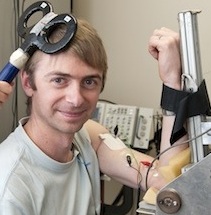Question: What are your thoughts on animal testing?
Keywords: animal, animal testing, research, testing, thought
Comments
-
commented on 15 Jun 2011:
Animal testing is horrible just get someones dead body and test the reaction on them, but honestly it’s just cruel, In my oppinion it should be band
-
commented on 15 Jun 2011:
I don’t like animal testing, I have seen what happens to animals, why not pay people to test it? make it voluntary instead of forcing animals to undergo the testing.
-
commented on 16 Jun 2011:
@taylorswift101 You are entitled to feel that way. In fact, I work with a few researchers who refuse to do animal work.
There are lots of things that you can’t measure in a dead body. And many of the genetic experiments we do would be impossible without animal models.
-
commented on 16 Jun 2011:
@toffeelola Where have you seen what happens to animals? I can assure that the animals we use are very well looked after and treated very humanely. i would have nothing to do with the work if was any other way.
-
commented on 16 Jun 2011:
i HATE animal testing there is no reason why a animal should be forced to do it. Why can’t you test it on people that volunteer? i personally do not like to use things that have been tested on animals and dislike it when people use animals for their own benefit.
-
commented on 16 Jun 2011:
@taylorswift: Of course you are entitled to feel that way. But as Darren said a lot of things cannot be measured in dead tissue. Dead tissue does not react at all like living tissue and many things are not possible in humans.
@toffeelola: As someone who does human research I assure you that not everything is possible in humans. Also it is considered unethical to ‘pay’ people to be a subject. We compensate them for any expenses they incur but you start paying people to be subjects it is not strictly voluntary as they can be coerced by the offer of money.
You also need to release that many other countries do not have the ethical and legislative protection of animals that Australia has. Just because you have seen things that happen in other countries does not mean that Australian scientists do these things.
-
commented on 18 Jun 2011:
I love that you guys are so passionate about this issue – thanks for being part of the debate!
Just one question – do you eat meat? The living conditions and rules about raising animals for food are a lot less strict than raising animals for medical research. Especially for chickens and pigs. I saw a documentary on the way some chickens are treated in battery farms for eggs and kept in horrible cages. Awful! I only ever buy free range ones now!
-
commented on 20 Jun 2011:
Thats so true! I wrote an essay on the cruelty to animals that we eat. Chickens are kept in tiny cages with others and have their wings cut. They are fed hormones so they get fat quicker, and in turn we eat them! They are force fed too. Chickens are put into boiling water and have their beaks cut off while they are still alive and concious. It’s so horrible.
-
commented on 21 Jun 2011:
Hi Jaquelin – Great to see you’re passionate about animal welfare!
-
-
-
commented on 20 Jun 2011:
Do any of you test animals in your research?
-
commented on 20 Jun 2011:
I think if animal testing is done humanely, its just the same as testing on humans.
-
commented on 21 Jun 2011:
I think that aniumal testing is cruel because what did the aniumals do to undergo experiments on them. It is just not right!
-
commented on 21 Jun 2011:
Hi duffy – thanks for your comment, its good to have your input into the discussion.
What kind of animal testing? What kind of animals? There are many different levels to this..
What about a fly? Fruit flies are used in genetics experiments to find new genes, and most of the time the genes in the flies directly relate to genes in humans. Is it ok to kill a fly to help find a cure?
What about a worm? Scientists also use small worms to study genetics, and many of the genes that go wrong during cancer were first discovered in worms. Can we use worms to learn more about cancer?
How about rats and mice? When they get into people’s house and in their cupboards, many people will use traps and rat poison to kill mice and rats, without all the strict guidelines that scientists use in the lab. What if doing an experiment on a mouse could prove a new drug can stop diabetes?
Or sheep and pigs? We keep sheep and pigs for food, can we also use parts of them for experiments? A pig heart is very much like a human heart, and we can learn so much about heart attacks and strokes from studying pigs.
So where do we draw the line? What is ok? What is worth it, to help save a human life?
These are all important questions, and there really isn’t a right or wrong answer, and I think it’s really good to have discussions like this and keep debating this issue. Thanks for your thoughts!
-
-
commented on 23 Jun 2011:
Well, I almost have mixed emotions about the topic of animals testing. I think it unwise to ‘test’ potentially hazardous drugs on animals. Where do you draw the line? To save a human’s life? Well, in some cases, that animal’s life could be worth more than that humans life. Not to sound harsh or cruel, but I feel it can kind of be like sacrificing an animal for you. It all depends, however,








If it’s done ethically and only when necessary then I have no problem with it.
We go to a lot of trouble to make sure any animal research is only done when there is no other way to do the experiment. Any animal testing is only done once the researchers have obtained approval from an ethics committee and there are very very strict rules about what we are allowed to do with animals.
Everyone I know that does animal work treats it as a very big responsibility and cares very deeply for the wellbeing of the animals.
1
Animal experiments are an important part of medical research and as long as the experiments are necessary and ethically performed, I think they should be allowed. The rules about animal experimentation are very strict in Australia. This ensures that only experiments that will yield important results and can’t be done another way are performed using animals. These rules also ensure that minimum number of animals are used and that the animals are treated properly before, during and after they participate in research.
Every institution that uses animals for research has a special committee that decides when it is ethical to use animals for research and enforces the rules. These committee include scientists, vets, lawyers, animal carers and lay members of the community.
0
Hi Ingridm, rking, unimaginable and swag… this is a really important issue and I am glad you are thinking about the ethics of research.
My thoughts are that without animal testing there would be more side effects and bad reactions to drugs and vaccines. I also think that without experimental animals, we would be less likely to discover new cures and be unable to really understand what is happening to the body during different diseases.
Drugs can react very differently in a dish with cells in the lab, to how they react in the whole body. The body is an amazing thing, and we still don’t understand everything about how it works. So we can’t recreate everything in a test tube or on a computer – but scientists do as much testing as possible by these methods before considering using animals.
Also, if we skipped testing on animals, and went straight into people, it would be far more risky to the volunteers. If there were lots of bad reactions to new therapies, then people might stop volunteering for clinical trials – which would slow down or even halt making discoveries into cures. I would not want to get into a situation where some people, like prisoners or soldiers, were forced to be part of medical experiments – which has happened in the past – due to a lack of volunteers. I also wouldn’t want to put people’s lives at risk by not properly testing new drugs and cures before giving them to patients.
And there are so many diseases that don’t have a cure, like Parkinson’s Disease, Alzheimers, cancer and diabetes, and important breakthroughs in these areas could come from animal experiments. I would not want to deny the people suffering from these diseases a chance for a cure.
There are lots of different views on animal testing, and it is good to talk about all the postiives and negative. Thanks for asking the tough, but important, questions!
1
This is a vey important question. As long as the experiments are done under strict controls,using a minimum number of animals and when absolutely necessary, I think animal testing should be allowed. It’s unfortunate but there is no avoiding testing theories and treatments in whole animals.
We use animals because we need to see how a vaccine or a drug works in a whole animal. Even if we take cells from a human breast cancer,for example,and grow them,we can test the drugs on them, but it won’t tell us if it is safe to use in a whole organism with many organs in it.We won’t know what other organs will be affected by it, or even if the drug works on anything other than cells in a dish.
We also use animals – or model organims like fruit flies, zebrafish, frog eggs and mice because they have a shorter life cycle than humans.A fruit fly takes about ten days to go from larvae to fly.A mouse takes six weeks to be an adult after birth. Humans take about 18 years to become adults.So initial testing in animals tells us relatively quickly whether our idea is a good one or the drug is effective.
There are very very strict controls and guidelines for working with animals, and this is really important. We have to treat them with great respect and care. It is a huge privilege to work with animals so their well being is paramount.
0